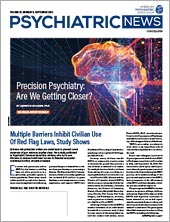The climate crisis is quickly becoming the greatest existential threat to most of Earth’s inhabitants. Increased awareness of this issue generates many distressing psychological experiences, including anxiety, panic, depression, and hopelessness.
Psychiatrists and mental health professionals will increasingly need to help individuals deal with these reactions. The techniques described here have been utilized and presented in scientific lectures and publications. Although there have been few, if any, controlled trials of these techniques for eco-anxiety, they have been extensively reported to be beneficial. These interventions are intended for adults and adolescents.
Anxiety, dread, discouragement, despair, hopelessness, grief, and guilt in relation to the climate crisis are normal responses. It is important to identify this for patients and not make them feel that their reactions are abnormal or pathological. If eco-anxiety is treated as an illness, the forces of climate denial will have won. Patients should be provided a safe space in which distressing emotions can be discussed and processed. After this, they can be helped with cognitive restructuring of the thoughts that led to these feelings and finally guided into constructive actions.
The stress of climate change may, in certain vulnerable individuals, lead to bona fide psychiatric conditions (especially generalized anxiety disorder or major depression). In such cases, significant impairing symptoms should be stabilized before beginning climate-oriented therapy.
Help patients to shift from catastrophizing and enable them to see that, while there is a crisis, positive things happen at the same time. Reassure them that guilt about their individual contributions to global warming is universal and borne by everyone. Moreover, it is critical to acknowledge that the larger systems issues driving climate change, especially the fossil fuel industries that have created global warming and their decades of disinformation, far outweigh individuals’ contributions to the problems. Patients should be empathically assisted to process grief associated with climate change. They should also be helped to see that current anxiety and grief may be an anticipation of future losses.
Encourage patients to feel hopeful about the future. Help them to believe that what we can do today is necessary, even though we may not know how, when, or for whom it will matter, and that the future is open and uncertain. Educate them about the concept that small actions sometimes have profound effects in complex systems.
Emphasize the value of developing effective coping strategies in the face of stress and the importance of self-care. Inform them that stress and trauma impact the mind and body and that anxiety can lead to neural and hormonal changes that affect the entire body, including muscles, sensation, the cardiovascular system, the gut, the reproductive system, and immunity. Caution them about substance use and other maladaptive behaviors that can heighten negative feelings.
Many techniques that alleviate anxiety and stress work with climate anxiety and distress. Deep breathing, progressive muscular relaxation, meditation, guided imagery, and mindfulness techniques are useful tools. They help individuals relax, stay grounded in the present, and observe their thoughts and reactions to situations. Assertiveness training is also helpful.
Healthy lifestyles promote resilience. Teach patients about the value of healthy diets, regular exercise, and the need for sufficient sleep. Being more involved in outdoor physical activities and taking time to be in contact with and appreciate the beauty of nature is rejuvenating and induces hope. Holding some therapy sessions outdoors can facilitate this.
Exploring patients’ strengths and ways they have managed adversity in the past can demonstrate their internal capacity to face present and future challenges. Encourage them to draw upon and strengthen their spiritual beliefs. Creative expression of eco-anxiety through art and writing is helpful.
The existence of strong social supports is extremely important. Help them identify and strengthen close connections with family, friends, and neighbors. If these are lacking, help them identify new sources of social support. Some climate-oriented support groups, which may prove useful, are listed in the box at left.
The most effective method to reduce anxiety and depression and sustain hope in the face of the climate crisis is to engage in purposeful action within one’s community and take individual action. The latter includes reducing fossil fuel use, making homes more energy efficient, and shifting to diets that are more plant based.
Groups that are welcoming and involved in a range of climate-improving activities are listed in the box. Purposeful action need not be centered exclusively on climate activities. Helping others in any fashion is likely to improve one’s sense of self, hope, and well-being.
Following a successful course of climate-focused therapy, a patient can productively deal with climate stresses and use them to increase meaning, purpose, and hope. Ideally, people should be able to make the following three statements: I understand how trauma and stress affect my mind and body. I have skills, a social support network, and other resources I can use in the face of adversity to calm myself and find new meaning and purpose. I accept the complexity of current world conditions and am committed to using my skills and resources to help others and to preserve the environment. ■

